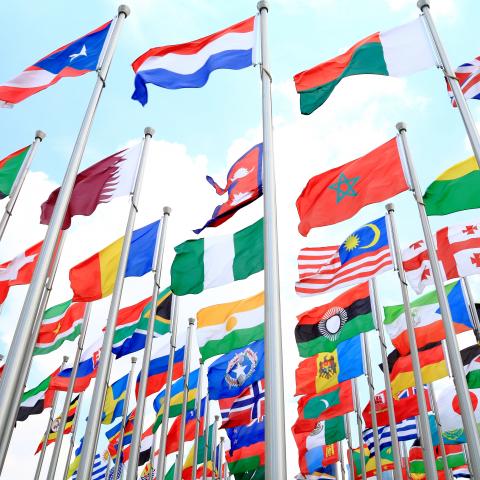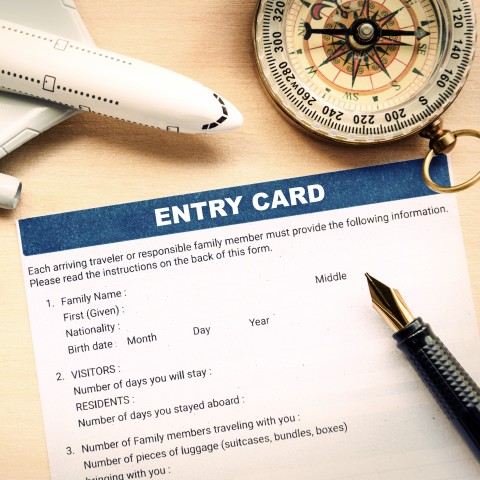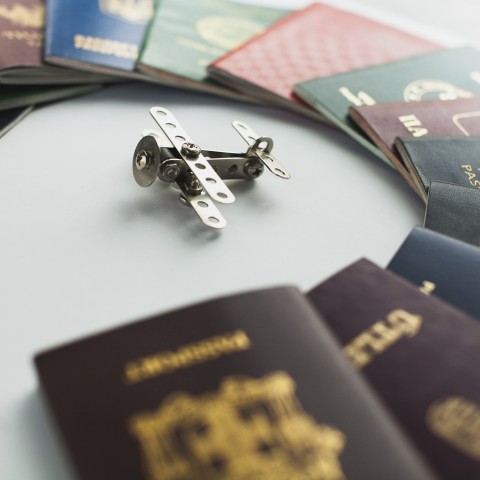
“What country are you from?”
“Are you American?”
“Can you speak Chinese?”
Get ready for these incoming questions when you go to China, especially when you don’t look Chinese, or don’t sound Chinese. As annoying as they might sound, these are actually great icebreaker questions to strike a conversation, and get to know people.
Knowing how to tell people about your nationality, and understanding the questions about nationalities in Chinese are one of the first things Chinese learners should learn. It’s also a good idea to learn a few other common nationalities, so you can make friends wherever you go! In this article, you’ll find useful phrases about nationalities in Chinese, and other related phrases for travelers!

 Table of Contents
Table of Contents
- Top 10 Countries and Nationalities in China
- How to Ask People About Their Nationality
- How to Tell People About Your Nationality
- Bonus: Countries, Cities and Languages
- Before You Go
1. Top 10 Countries and Nationalities in China
The very first must-know word in Chinese that’s related to countries and nationalities is of course - China 中国 Zhōngguó.
Here’s an easy formula to say nationality in Chinese:
China + 人 rén
“China + person”
For example, the people who are from China, Chinese citizens or Chinese nationals, are called 中国人 Zhōngguó rén.
Top 10 Foreign Visitors to China By Nation
To learn more about nationalities in Chinese, let’s first find out what the top nationalities that visit China are. According to this survey, the top 10 foreign visitor arrivals to China for sightseeing in 2017 by nations, are listed below. See if you can find your nationality in this chart.

| Rank | Nation |
| 1. | 🇰🇷 韩国 Hánguó “South Korea” |
| 2. | 🇷🇺 俄罗斯 Éluósī “Russia” |
| 3. | 🇺🇸 美国 Měiguó “United States of America” |
| 4. | 🇲🇾 马来西亚 Mǎláixīyà “Malaysia” |
| 5. | 🇯🇵 日本 Rìběn “Japan” |
| 6. | 🇹🇭 泰国 Tàiguó “Thailand” |
| 7. | 🇮🇳 印度尼西亚 Yìndùníxīyà “Indonesia” |
| 8. | 🇸🇬 新加坡 Xīnjiāpō “Singapore” |
| 9. | 🇨🇦 加拿大 Jiānádà “Canada” |
| 10. | 🇦🇺 澳大利亚 Àodàlìyà “Australia” |
To turn these countries into nationalities, all you need to do is add 人 rén after the country name.
| Rank | Nation | Nationality |
| 1. | 🇰🇷 韩国 Hánguó “South Korea” | 🇰🇷 韩国人 Hánguó rén “South Korean” |
| 2. | 🇷🇺 俄罗斯 Éluósī “Russia” | 🇷🇺 俄罗斯人 Éluósī rén “Russian” |
| 3. | 🇺🇸 美国 Měiguó “United States of America” | 🇺🇸 美国人 Měiguó rén “American” |
| 4. | 🇲🇾 马来西亚 Mǎláixīyà “Malaysia” | 🇲🇾 马来西亚人 Mǎláixīyà rén “Malaysian” |
| 5. | 🇯🇵 日本 Rìběn “Japan” | 🇯🇵 日本人 Rìběn rén “Japanese” |
| 6. | 🇹🇭 泰国 Tàiguó “Thailand” | 🇹🇭 泰国人 Tàiguó rén “Thai” |
| 7. | 🇮🇳 印度尼西亚 Yìndùníxīyà “Indonesia” | 🇮🇳 印度尼西亚人 Yìndùníxīyà rén “Indonesian” |
| 8. | 🇸🇬 新加坡 Xīnjiāpō “Singapore” | 🇸🇬 新加坡人 Xīnjiāpō rén “Singaporean” |
| 9. | 🇨🇦 加拿大 Jiānádà “Canada” | 🇨🇦 加拿大人 Jiānádà rén “Canadian” |
| 10. | 🇦🇺 澳大利亚 Àodàlìyà “Australia” | 🇦🇺 澳大利亚人 Àodàlìyà rén “Australian” |
2. How to Ask People About Their Nationality
To ask someone about their nationality, or where they are from, there are a few common ways.
1. 你是哪国人?Nǐ shì nǎ guó rén?
Literal translation: You are which country person?
Natural translation: Which country are you from?
Note: This question is specifically asking for 国 guó “country”. There is a more general way to ask where someone is from, which applies to all, from hometown to home country. See question #3 below.
2. 你是哪个国家的?Nǐ shì nǎge guójiā de?
Literal translation: You belong to which country?
Natural translation: Which country are you from?
Note: This is a casual variation of 你是哪国人?Nǐ shì nǎ guó rén? Both of them are used to ask about someone’s home country.
3. 你是哪里人?/ 你是哪儿人?Nǐ shì nǎlǐ rén?/ Nǐ shì nǎr rén?
Literal translation: You are where person?
Natural translation: Where are you from?
Note: 哪里 nǎlǐ and 哪儿 nǎr both mean “where”, and they are interchangeable. People from the north part of China tend to use 哪儿 (nǎr) more often, and people from the south part of the China prefer to use 哪里 (nǎlǐ).
4. 你来自哪里?Nǐ láizì nǎlǐ?
Literal translation: You come from where?
Natural translation: Where do you come from?
Note: The word 来自 láizì is a formal way of saying “to come from.” You would often hear it being used in a self-introduction to a group of people, such as in a class, workshop, on stage, or other relatively formal settings.

5. 你是什么国籍?Nǐ shì shénme guójí?
Literal translation: You are what nationality?’
Natural translation: What’s your nationality?
Note: This question turns the formality to the highest level. You are more likely asked this question when you’re going through customs and immigration at the airport, or filling out a form in a city hall.
- ❖ Cultural Tip 1: If you’re interested in Nationality Law of the People’s Republic of China, such as the application of restoration of Chinese nationally, visit this government website.
❖ Cultural Tip 2: If you’d like to know the difference between the Republic of China and People’s Republic of China, check out this source.
3. How to Tell People About Your Nationality
To respond to the questions above, there are three ways.
1. 我是 China 人。Wǒ shì China rén.
“I’m a China person.”
2. 我来自 China。Wǒ láizì China.
“I come from China.”
3. 我的国籍是 China。Wǒ de guójí shì China.
“My nationality is China.”
Note: When filling out a form, you can put your 国家 guójiā “country” in the 国籍 guójí “nationality” section. You don’t have to write China 人 rén, like you would in spoken language. For example, when filling out an entry card when arriving at a Chinese airport, in the nationality section, you could simply write 美国 Měiguó.

4. Other Ways to Tell About Your Origin
For those of you who have been moving around, and whose situations are a little too complicated to fit in one of the patterns above, here are some other phrases you could choose from.
- 我的爸爸/妈妈是 [country A ] 人。我是在 [country B] 长大的。
Wǒ de bàba/māma shì [country A] rén. Wǒ shì zài [country B] zhǎng dà de.
“My dad/mom is [country A] person. I grew up in [country B].”
- 我在 [country A] 出生,在 [country B] 长大。
Wǒ zài [country A] chūshēng, zài [country B] zhǎng dà.
“I was born in [country A], and grew up in [country B].”
- 我是 [country A] 人,不过我现在住在 [country B]。
Wǒ shì [country A] rén, búguò wǒ xiànzài zhù zài [country B].
“I’m a [country A] person, but now I live in [country B].”
- 我是双重国籍,[country A] 和 [country B]。
Wǒ shì shuāngchóng guójí, [country A] hé [country B].
“I have dual citizenship: [country A] and [country B].”
- 我是 [country A] 人,也是 [country B] 人。
Wǒ shì [country A] rén, yěshì [country B] rén.
“I’m a [country A] person, and also a [country B] person.”

4. Bonus: Countries, Cities and Languages
If you’re learning a foreign language, chances are you’re passionate about exploring the world. Let’s take this opportunity to dig a little deeper into the countries, cities and languages around the world by learning how to say the related phrases in Chinese.
I’ve expanded the table above to add the columns of capital cities, major cities and languages.
| Nation | Capital City | Major City | Main Language(s) |
| 🇨🇳中国 Zhōngguó “China” | 北京 Běijīng “Beijing” | 上海 Shànghǎi “Shanghai” | 汉语 hànyǔ “Chinese language” |
| 🇰🇷 韩国 Hánguó “South Korea” | 首尔 Shǒu’ěr “Seoul” | 釜山 Fǔshān “Busan” | 韩语 hányǔ “Korean language” |
| 🇷🇺 俄罗斯 Éluósī “Russia” | 莫斯科 Mòsīkē “Moscow” | 圣彼得堡 Shèngbǐdébǎo “St. Petersburg“ | 俄语 éyǔ “Russian language” |
| 🇺🇸 美国 Měiguó “United States of America” | 华盛顿 Huáshèngdùn “Washington DC” | 纽约 Niǔyuē “New York” | 英语 yīngyǔ “English language” |
| 🇲🇾 马来西亚 Mǎláixīyà “Malaysia” | 吉隆坡 Jílóngpō “Kuala Lumpur” | 新山 Xīnshān “Johor Bahru” | 马来语 mǎláiyǔ “Malaysian language” 华语 huáyǔ * “Chinese language” 英语 yīngyǔ “English language” |
| 🇯🇵 日本 Rìběn “Japan” | 东京 Dōngjīng “Tokyo” | 大阪 Dàbǎn “Osaka” | 日语 Rìyǔ “Japanese language” |
| 🇹🇭 泰国 Tàiguó “Thailand” | 曼谷 Màngǔ “Bangkok” | 清迈 Qīngmài “Chiang Mai” | 泰语 Tàiyǔ “Thai language” |
| 🇮🇳 印度尼西亚 Yìndùníxīyà “Indonesia” | 雅加达 Yǎjiādá “Jakarta” | 泗水 Sìshuǐ “Surabaya” | 印尼语 Yìnníyǔ “Indonesian language” |
| 🇸🇬 新加坡 Xīnjiāpō “Singapore” | 新加坡市 Xīnjiāpō shì “Singapore City” | n/a | 英语 yīngyǔ “English language” 华语 huáyǔ “Chinese language” 马来语 Mǎláiyǔ “Malaysian language” |
| 🇨🇦 加拿大 Jiānádà “Canada” | 渥太华 Wòtàihuá “Ottawa” | 多伦多 Duōlúnduō “Toronto” | 英语 yīngyǔ “English language” 法语 fǎyǔ “French language” |
| 🇦🇺 澳大利亚 Àodàlìyà “Australia” | 墨尔本 Mò’ěrběn “Melbourne” | 悉尼 Xīní “Sydney” | 英语 yīngyǔ “English language” |
* Chinese language is referred to as 华语 huáyǔ mostly in southeast asian countries where Mandarin is spoken.
To use the phrases we’ve covered in this article to make self-introductions in Chinese, here are two examples:
- ➢ 大家好!我来自韩国首尔。我会说韩语和汉语。
Dàjiā hǎo! Wǒ láizì Hánguó Shǒu’ěr. Wǒ huì shuō hányǔ hé hànyǔ.
“Hello everyone! I come from Seoul, Korea. I speak Korean and Chinese.”
- ➢ 我是加拿大人。我是在渥太华出生,多伦多长大的。我会说英语、法语还有汉语。
Wǒ shì Jiānádà rén. Wǒ shì zài Wòtàihuá chūshēng, Duōlúnduō zhǎng dà de. Wǒ huì shuō yīngyǔ, fǎyǔ hái yǒu hànyǔ.
“I’m Canadian. I was born in Ottawa and I grew up in Toronto. I speak English, French and Chinese.”
5. Before You Go
Hope this article helps you build up your vocabulary about nationalities, and you are now more prepared to answer questions like “What country are you from?” “Are you American?” “Can you speak Chinese?”
Don’t forget to explore the abundant vocabulary lists on ChineseClass101.com. Practice with audio recordings and speak with more confidence.
If you’d like to further boost your Chinese skills and learn with specific goals, you can always upgrade to Premium PLUS subscription and get 1-on-1 coaching from your own private teacher, who will customize a Chinese learning pathway just for you!
Ask your teacher about personalized exercises, assignments, and audio samples, they would be more than happy to find the right materials for you. On top of that, feedback and necessary corrections will always be ready for you within 2 business days. Find your private teacher now on ChineseClass101.com!










